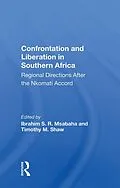The 1984 "Nkomati Accord"-a bilateral security agreement between South Africa and Mozambique to eliminate guerrilla threats on both sides of a common border-was a milestone in regional confrontation and cooperation. Yet, the real challenge to the white South African regime is not external; it is internal opposition to apartheid. This volume, written by leading African scholars, begins by exploring the origins of racism and nationalism in Southern Africa. The contributors discuss the spread of nationalist movements throughout the region, arguing that South Africa has attempted to resist, divert, or undermine the domino effect by capitalizing on the Nkomati Accord. The authors focus on the legal aspects of the Accord, its impact on the foreign and defense policies of the Front Line States, prospects for regional development and economic integration, and potential outcomes of the national liberation struggles in Southern Africa.
Autorentext
Ibrahim S. R. Msablha. is Director of Studies ani Progr~ at the center for Foreign Relations in Tanzania as well as lecturer in interna.tionaJ. relations ani diplomacy at the University of Dar es Salaam. Dr. Msa.baha. holds a Ph.D. from Dalhousie University in Canada. Timothy H. Shaw is Professor of Political Science ani Director of the center for African Studies at Dalhousie University in Nova Scotia.
Inhalt
PART 1. PRESENT STRUGGLES IN SOUTH AFRICA AND NAMIBIA PART 2. IMPACT ON THE FRONT LINE STATES I FOREIGN POLICY AND DEFENSE POLICIES, PART 3. REGIONAL INTERGRATION: SACC AND PTA PART 4. LEGAL AND INSTITUTIONAL ASPECTS OF NKOMATI
